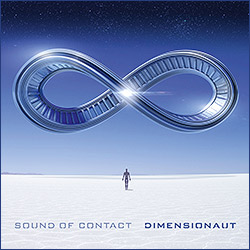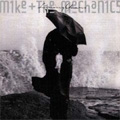


Being the son of Phil Collins may have brought many perks for Simon Collins, but in the end he may have come to the conclusion that the disadvantages it brings in certain situations weigh more heavily. None of his three solo albums could be published without the badge „Phil's Son“; he snuck in his father in the credits for the backing vocals for Pride on his debut All Of Who You Are. In his previous album U Catastrophe he did not even try to hide him but recorded a drum duel with him instead.
Musically, however, Simon Collins did not seem to develop a lot. When he met Dave Kerzner he eventually had the idea of forming a band. Sound Of Contact have been around for a while, but their first album comes out only now. The band took their time with the album and they also needed to find a record company, which turned out to be InsideOut. This may seem peculiar to some people, for InsideOut are a record label for prog bands. But quite a bit of the music Sound Of Contact play falls right into this genre. There are still vestiges of the „Son Of Phil“ label, but Simon has obviously found his feet in the band – and the musicians see eye to eye in this band project, so this is not „the new project of Phil Collins' son Simon“.
 It makes a lot of sense to do away with all the comparisons as much as possible. It will not work out completely because of the quality of the music. Truth be told, the album is reviewed on this website mainly because Simon is the son of the Genesis musician Phil Collins. It is a pleasant coincidence, though, that Simon and the band offer us a very lively prog rock album that many Genesis fans may enjoy. The band consists of these four musicians:
It makes a lot of sense to do away with all the comparisons as much as possible. It will not work out completely because of the quality of the music. Truth be told, the album is reviewed on this website mainly because Simon is the son of the Genesis musician Phil Collins. It is a pleasant coincidence, though, that Simon and the band offer us a very lively prog rock album that many Genesis fans may enjoy. The band consists of these four musicians:
Simon Collins (drums, vocals)
Dave Kerzner (keyboards)
Kelly Nordstorm (bass, guitars)
Matt Dorsey (guitars, bass)
There is also Hannah Stobart as a guest singer. The album was produced by Simon Collins and Dave Kerzner, while an old acquaintance did much of the mixing on the album: Nick Davis.
Dimensionaut is a musical journey. It is a concept album. Not everything is clear, lots of things just „hover around“ and that is, as it were, the core concept. Many songs are about Earth and creatures whose origin is not quite clear. What is clear is that many things are seen from above or from other dimensions. Simon takes up an old favourite topic with this. He has been very involved with the environment, planets and dimensions. But there are not only lyrical, but also musical common threads. The first song, which gave the band their name, is a kind of intro where keywords are thrown into the room before the music proper begins with Cosmic Distant Ladder. It all seems very fresh, rocky with sophisticated arrangements. The sound moves in a timeless zone with elements of the 90s and most of all – this is where we have to compare – there is a touch of the sounds of Duke or Abacab. After all, Simon grew up with Genesis. After the slightly overflowing Cosmic Distant Ladder, Pale Blue Dot is the first „normal“ rock song with hit potential. Pale Blue Dot is not straightforward, it has its edges and sudden turns. Simon's vocals are melodious, memorable and work very well for the song. It is obvious that he has developed as a singer. There is a certain resemblance with Phil's voice, but Simon sings a lot deeper and rougher.
The balladesque I Am Dimensionaut takes some speed out of the journey. It has quite a thick blanket of guitars, particularly in the chorus. The song later moves into a playful jam where you can hear typical Collins drum fills. The song is a fine transition to one of the album highlights, Not Coming Down. It sounds rather harmless in the beginning, but soon develops into a hit candidate. No wonder that Not Coming Down will be released as a single. It is a catchy song with few prog elements (apart from the middle part which was left out for the single version), but remarkably good!
Remote View is another catchy song, this time a bit more up-tempo. Spot the excellent drumming and the rhythmic changes. The distorted voice gets a bit on the reviewer's nerves, but your mileage may, of course, vary. There are some Floyd influences on the ethereal Beyond Illumination where Simon sings a duet with Hannah Stobart. Collins plays his typical drum fills – it is good to hear the album was recorded with real drums, a thing that is not a matter of course anymore. The female voice offers a pleasant contrast to Simon's dark, smoky voice. Beyond Illumination has a fine contrast between the verses and the chorus. Simon's previous albums had few songs and song structures that are as sophisticated – or none at all.
Only Breathing Out and particularly Closer To You have excellent melodies that are catchy without drifting away too far from the musical concept. Between the two there is Realm Of In-Organic Beings, a sort of instrumental that stands up very well with the big instrumentals of the prog genre. It sounds a bit like a mixture of Pink Floyd's The Great Gig In The Sky and Mike Oldfield's The Top Of The Morning.
 Omega Point could be the closer of the album. It is a lively, compact prog song with an (un-?) intentional quote from Simon's past as one of the lines reads „all of who you are“. Musically it is a faster song than the previous slower pieces. But Omega Point is not the closer, for the album's central piece is yet to come. Möbius Slip is at 20 minutes length a purebred prog suite a la Supper's Ready or the Misplaced Childhood Suite. It illustrates that Sound Of Contact have written a big album here. The suite has intricate moments, i.e. very progressive parts, as well as lighter bits. And contrary to many other musical constructions of comparable length it seems like a unity, an intelligent and coherent arrangement that does not appear to be parts stuck together. Towards the middle of the song it really rocks, the guitars come to the fore like nowhere else on the album. Some 12 minutes into the song the Genesis influence becomes unmistakable – Sound Of Contact pay homage to the Apocalypse In 9/8 that was the core piece in Supper's Ready.
Omega Point could be the closer of the album. It is a lively, compact prog song with an (un-?) intentional quote from Simon's past as one of the lines reads „all of who you are“. Musically it is a faster song than the previous slower pieces. But Omega Point is not the closer, for the album's central piece is yet to come. Möbius Slip is at 20 minutes length a purebred prog suite a la Supper's Ready or the Misplaced Childhood Suite. It illustrates that Sound Of Contact have written a big album here. The suite has intricate moments, i.e. very progressive parts, as well as lighter bits. And contrary to many other musical constructions of comparable length it seems like a unity, an intelligent and coherent arrangement that does not appear to be parts stuck together. Towards the middle of the song it really rocks, the guitars come to the fore like nowhere else on the album. Some 12 minutes into the song the Genesis influence becomes unmistakable – Sound Of Contact pay homage to the Apocalypse In 9/8 that was the core piece in Supper's Ready.
The biggest surprise on the album is probably the progressive vein that moves through all the songs. Simon Collins, Dave Kerzner and the band as a whole can congratulate themselves on writing a series of great tunes. Not Coming Down and Beyond Illumination are particularly suited for radio airplay. There is nothing thrown together here, though, but the art of making it all coherent and cohesive. Sure, it is a concept album, but how many people have failed with the concept of making a concept album? Just sticking together a couple of songs and adding esoteric lyrics is not enough. Sound Of Contact have managed to write a concept album that is unbelievably light. You can listen to it in one go. They have converted the weight of an album with lots of keyboards on it into pure listening enjoyment. You will not get around the fact that Collins is a Collins – his drumming is distinctive, his voice will always resemble his father's to some degree. And Möbius Slip never be able to avoid comparison with Supper's Ready. But Simon Collins has begun to blaze his own trail with this album – and what he needed was the musical corrective of Dave Kerzner, whose keyboard work and sounds are the integral part of the album.
Tracks:
01 Sound Of Contact [2:05]
02 Cosmic Distance Ladder [4:44]
03 Pale Blue Dot [4:44]
04 I Am Dimensionaut [6:25]
05 Not Coming Down [6:01]
06 Remote View [3:54]
07 Beyond Illumination (feat. Hannah Stobart) [5:53]
08 Only Breathing Out [5:57]
09 Realm Of In-Organic Beings [2:52]
10 Closer To You [5:05]
11 Omega Point [6:30]
12 Möbius Sleep [19:36]
12.1 In The Difference Engine
12.2 Perihelion Continuum
12.3 Salvation Found
12.4 All Worlds All Times



Second Mechanics-Album from 1988, contains the US-Nr. 1-Hit The Living Years.